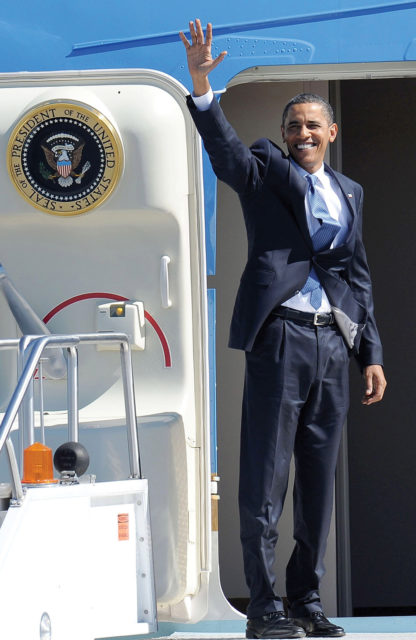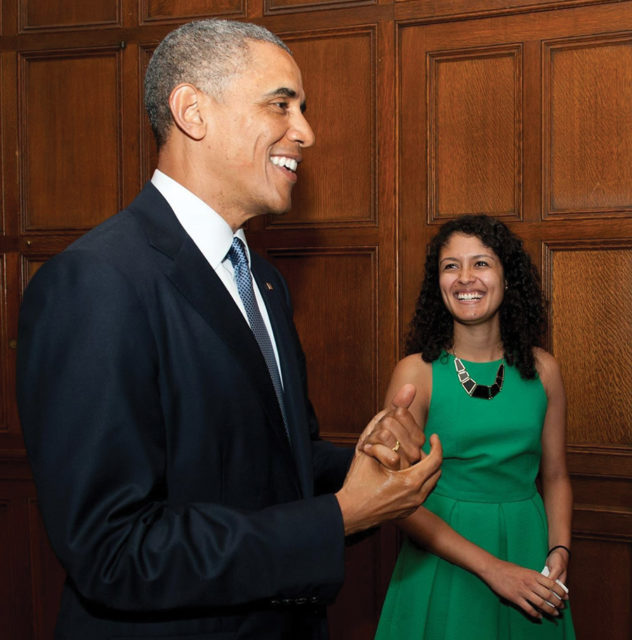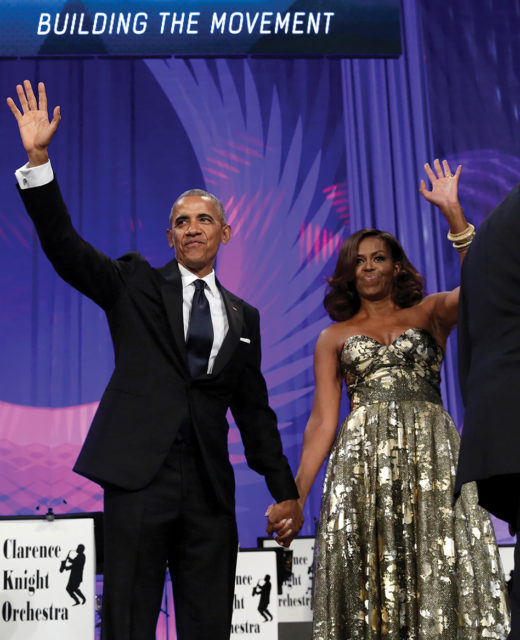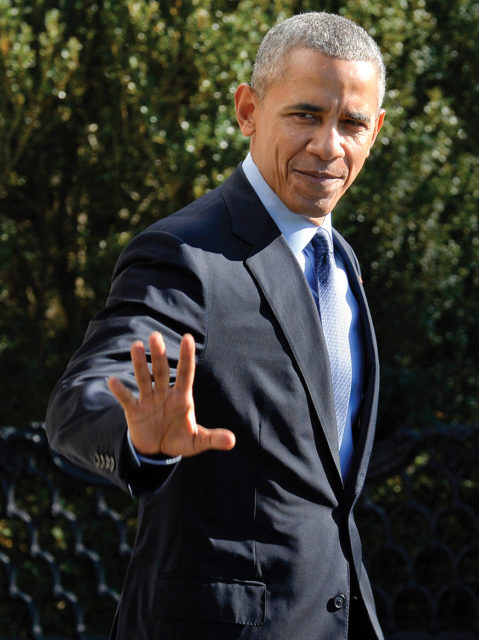We salute Presdient Obama for his triumphant tenure as our nation’s leader, highlighting his hard-earned legacy of protection, progress and empowerment for women, LGBTQ persons, people of color and many vulnerable communities previously ignored by the federal government’s policies and programs.
In just a few days, one of the most consequential U.S. presidents in history will leave the White House. President Obama, the progressive leader who led a virtually scandal-free administration and profoundly shaped our nation’s discourse and action on civil rights, will enter a new chapter as former president. He exits office with a more than 56 percent approval rating, a record 73-month streak of total job growth, and an unemployment rate of under five percent, which was more than double that number when the president took office. He has commuted a record number of sentences, banned private prisons at the federal level, and prohibited solitary confinement for juveniles. President Obama’s Executive Action on DACA (Deferred Action for Childhood Arrivals) has granted temporary deportation relief and work authorization to nearly three-quarters of a million young people. And, even as the other side poises to repeal the Affordable Care Act (“Obamacare”), the president’s signature law has allowed more than 16 million Americans to enroll in health care coverage.
But the transition of power from our current leader to his successor could not represent a starker difference in priorities and values: We’re shifting from President Obama, a man who began as a community organizer and used his power to uplift underrepresented communities and families while changing hearts and minds in the process; to Donald Trump, a man who rode into “victory” on a tide of discrimination, questionable business practices and the silencing of dissenting voices. Although we are mourning the loss of a champion for social justice and progress in the highest office in our nation, I’m confident that because of the “long game” President Obama has always favored to play, the progress realized in the last eight years will outlast the next administration—and continue to serve as the foundation of progress for generations to come.

President Obama consistently took the “long game” approach from the beginning of his presidency—especially in light of racist backlash against his election—and he enabled a deep and beyond-pivotal transformation of American and global cultural views. Consequently, public support for social progress grew until change was inevitable. Rather than imposing a set of beliefs on a divided country, President Obama took meaningful steps to unequivocally show the humanity of those affected by outdated laws and practices, and little by little, chipped away at ignorance and misinformation eventually supplanted by acceptance and understanding. Indeed, the Obamas, as our country’s first Black First Family, served as a constant reminder of the progress they quite literally embodied. They paved the way for the White House to truly become the “People’s House,” inviting the most diverse and far-reaching groups and individuals to the proverbial table, as opposed to the traditional elite.
Regarding LGBTQ equality, the president’s strategic, calculated approach resulted in the most sweeping legal, legislative and policy-based protections in our nation’s history, followed by swiftly increasing public support. Early in his administration, President Obama appointed openly LGBTQ people to notable senior staff positions across the White House and federal agencies, and created the Office of Public Engagement with a full-time LGBT liaison tasked with serving as both an internal and external spokesperson on LGBTQ issues. The president and his administration achieved seemingly small victories that, in reality, profoundly affected the everyday lives of LGBTQ Americans, such as the State Department’s policy change allowing for transgender citizens to list their true gender on passports; directing all hospitals receiving Medicaid and Medicare funding to extend hospital visitation rights to same-sex partners; and banning insurance companies from discriminating against anyone with a pre-existing condition or turning someone away because of their gender identity or sexual orientation. President Obama ubiquitously used the phrases “who you are and who you love” and “gays and lesbians” in his speeches, including his history-making mentions of our community in his State of the Union addresses. He extended full benefits to same-sex partners of federal employees and was the first president to appoint openly transgender officials, all of which legitimized and uplifted LGBTQ people and validated their right to live free from discrimination.

These incremental changes were buttressed by a committed Department of Justice that refused to defend DOMA, the so-called “Defense of Marriage Act”—a crucially progresive stance that helped to weaken the discriminatory law, secure legislative victories, and pave a path to the Supreme Court decision in June of 2015 that deemed marriage equality a constitutionally protected right.
As a queer woman of color who had the privilege and honor of serving my country in the Obama administration and playing a part in the “long game,” I worked to uphold the values of our President and sought to expand the progress achieved by my predecessors in the role and collaboarted with colleagues by examining ways to include more women, people of color, trans/GNC and bisexual people in our community through my own intersectional lens. It’s why I was empowered to think outside the box and host a strategy briefing with transgender women of color leaders, organize a policy discussion with bisexual activists and subject matter experts, and help lead efforts condemning so-called “conversion therapy” for minors, which built momentum for state lawmakers to introduce legislative bans, as well as a congressional ban, to bar that unscientific and widely debunked practice federally.
I’m grateful we’ve had a president so demonstrably committed to protecting those most vulnerable, and thankful that in addition to sharing the White House with a strong First Lady, he relied on strong women—strong women of color, I might add—to advocate for forward-thinking policy changes and strategic decisions. It was the leadership of Senior Advisor Valerie Jarrett who, early in the administration, quietly met with LGBTQ service members to dismantle “Don’t Ask, Don’t Tell,” and who quickly became the fiercest federal ally to our community on some of the most important, life-saving issues of the past eight years. The tireless work of the first-ever Director of the Office of Public Engagement Tina Tchen (now the First Lady’s Chief of Staff), who met with active-duty transgender troops at risk of separation, helped foster this year’s Defense Department policy change allowing the open service of transgender service members; not to mention Tchen’s bold initiatives supporting women in combat and efforts to end sexual assault in the military. Or, take the courageous battles fought by Cecilia Muñoz, Chair of the Domestic Policy Council, without whom the executive order banning discrimination by federal contractors would not have been possible. Under the leadership and based on the bold ideas of Jarrett and Tchen, the White House was lit in Pride colors on the day of the Obergefell v. Hodges Supreme Court decision.

President Obama presents the Presidential Medal of Freedom to comedian and talk show host Ellen DeGeneres during a ceremony in the White House East Room
While President Obama’s eight years were not perfect, as no president’s tenure could be, the example he set and the good he inspired positively affected how the nation and the world viewed the office of the President. As Black people in positions of unprecedented power, President Obama and First Lady Michelle Obama were forced to absorb ruthless racism and obstruction with a smile, and faced with grace myriad obstacles and challenges that failed to apply to virtually any of their predecessors. Yet, confronted with so much vitriol, the Obamas raised the bar of the responsibilities of the First Family, using their influence to inspire Americans—especially young people—to take ownership in our democracy and fight for what’s right.
With respect to their employees, at any given point, late into the night and on weekends, my colleagues in the White House wracked their brains to figure out how they could make people’s lives better. All across the government, folks asked the tough questions of how to disseminate information to more low-income families so they could sign up for the Affordable Care Act; or how we could make it easier and safer for girls around the world to go to school; or how to protect the nearly 1.8 million Dreamers living in our nation. These principles resulted directly from President Obama’s expectations of himself: stalwart commitment to public service, imbuing that culture in the government, and thus attracting diverse minds from around the country eager to tackle some of the most difficult challenges facing our nation’s people.

The Obama Administration boldly lit the White House in Pride colors following the Supreme Court’s landmark marriage equality decision.
Many Americans in the most disproportionately affected communities—Black and Latino communities, first Americans and Indian Country, immigrants and refugees, LGBTQ youth and adults, people with disabilities, women—are understandably anxious about what’s to come in the next four years, and terrified of the potential reversal of the federal gains critical to their protection and survival. And yes, there is much to fear, beginning with the primarily elite circle of extreme right-wingers tapped to lead our nation. There is a nominee for Attorney General who once called the NAACP “un-American.” The pick for Labor Secretary is someone who publicly opposes the minimum wage. The possible next Secretary of Education is a woman who has donated hundreds of thousands of dollars to groups who support the spread of so-called “conversion therapy.” Our next Vice President vehemently opposes access to abortions and advocates for decimating women’s reproductive rights, supports policies that allow businesses to discriminate against LGBTQ people, and has implied that we talk too much about racism in police departments. And, of course, the President-elect ran a divisive campaign propelled by a bullying demeanor and promise to “build a wall”; a man who, thus far, has had to take no accountability for his actions—including allegations of sexual assault, bragging about his failture to pay federal income taxes since the ‘90s, or his notorious tweets that often target private citizens and incite bigoted vitriol in his more extreme followers.
But while the landscape may appear bleak for the New Year, our current president has always thought beyond his limited tenure. The proof of his “longer view” can be found in the wealth of regulations his team published in key federal laws that protect against discrimination; in the number of public lands he designated as national monuments, thereby protecting them from destruction; and the bench of diverse young talent he and the First Lady have recruited and trained to take the reins of our movement as the next generation of leaders. Ultimately, the cultural shift he helped to galvanize will endure for generations to come. And although President Obama will not be succeeded by the first woman candidate nominated by a major political party, he has left an indelible mark on our culture, our businesses, and what we as women—as queer and trans women, as queer women of color—know to be possible for ourselves and our futures.
Aditi Hardikar is the former LGBT Liaison at the White House. She was most recently the Coalitions Finance Director for the Hillary for America campaign.
Photo credits (top to bottom): Everett Collection / Shutterstock.com; REUTERS/Yuri Gripas; REUTERS/Carlos Barria; Rena Schild/SHUTTERSTOCK

What Do You Think?